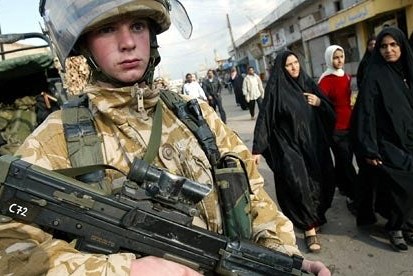EPA photo
By
Rupen Savoulian
While we condemn militias in non-Western societies for recruiting child soldiers, the deployment of child soldiers is nothing new in the West.
The Manchester terrorist bombing has, quite rightly, attracted condemnation from all quarters of the political and ethnic spectrum. It is with a heavy heart that one reads about the details of this cowardly, terrorist attack. Sadness at the loss of life is tempered by the heartening displays of solidarity and compassion demonstrated by thousands in the immediate aftermath of the atrocity. The Morning Star newspaper carried an article on May 25 stating that solidarity and courage are required to defeat terrorism, and that the psychopathic murderer (or murderers) responsible for this latest outrage will not triumph over our common humanity.
There will be more commentary about the Manchester bombing in the coming weeks and months. Without going into a detailed analysis of this atrocity here, it is worth noting that one of the most distressing aspects of this cowardly attack are the child victims. The latter arouse in us a particular empathy for the families of the deceased, and a stronger revulsion for those responsible for their deaths. Children’s lives cut down by a horrible attack evoke in us an understandable and necessary response – the ‘something must be done’ rejoinder. This aspect led me to consider the general subject of children caught up in war, and specifically about the subject of child soldiers.
A typical example of how we view child soldiers – particularly from African, Asian and other non-white nationalities – is provided by the Sudanese Australian and 2016 Australian of the Year Deng Adut. Adut, a refugee from the South Sudanese conflict and currently a lawyer, described his journey from forcible child soldiering in his home country to refugee advocate in Australia.
Abducted and forcibly recruited by a militia group, he gave details about the harrowing experiences of a child soldier. A witness to, and sometimes participant in, horrifying violence, he has demonstrated tremendous personal courage in not only escaping the terrible circumstances of his youth, but also in turning his life around and becoming a successful person. Adut still has nightmares about his time as a youthful recruit, forced to perform and view terrifying and disturbing acts of violence. His resilience in the face of such tremendous difficulties and personal trauma is commendable. His story is inspirational, to be sure. His journey, like that of many former child soldiers, is full of pathos – the tragic victims of violent circumstances that were beyond their control.
Please do not misconstrue my motivations – I am happy that he is alive and well, successful in his chosen profession. I am glad that he is able to live a peaceful life, and give of himself to others. His story, and the stories of other celebrity-child soldiers – such as Ishmael Beah – have come to represent indomitable human courage in the face of terrible adversity.
This stereotype of the child soldier – a passive victim, forced into combat by cult-like brainwashing, or loyalty to a maniacal, power-hungry dictator – is only one part of a multi-faceted story. Western audiences understand child soldiers to be African, Asian or non-white in origin – popularised by blockbuster movies such as Blood Diamond. That stereotype lends itself quite easily to the next logical step in the drama – Western intervention ‘to do something’. The non-white child soldier is seen an irrational, drug-induced budding psychopath, very impressionable and ready to kill. This leaves us with several unanswered and serious questions.
The British Army – one of the main pillars of the British nation-state – is still recruiting child soldiers. Back in December 2015, Mark Bostridge writing in The Guardian newspaper pointed out that Britain is the only country in Europe, and only one of a handful worldwide, that still recruits 16-year olds into its ranks as soldiers. Minors are targeted by recruitment campaigns approved and promoted by the Ministry of Defence. Army recruiters disproportionately target schools in economically disadvantaged areas, and readily recruit youths from low-income backgrounds.
These child soldiers – integrated into the army – are at higher risk of developing post-traumatic stress disorder and suicide. Chris Atkins, writing in The Guardian back in 2013, highlighted the stories of those British child soldiers who serve in the infantry, the latter the branch of the army where under-18s are over-represented. Atkins explains that:
David Buck joined the army at 17, saw active duty in Kosovo when he was just 19, and witnessed mass graves and burning bodies. On returning to civilian life at 26 he was diagnosed with PTSD, which he attributes to seeing such horrific images at such a young age. He also experienced bouts of severe alcoholism when he returned from fighting in Iraq. “I was trying to get away from the mental torture of PTSD,” he told the Guardian.
Buck says he was swayed by the brochures he read at the recruitment office. “It’s just deception. It doesn’t show someone with their head blown off.” He recalls images that glamorised army life, with recruits abseiling and skiing. “Being so young I was easily manipulated with the stuff they shovel down your neck in the careers office,” he said.
The army presents itself as a way out of deprived circumstances, an avenue of upward social mobility out of a deindustrialised and marginalised community. In a way, the military cashes in on the lack of educational and social opportunities. Communities devastated by neoliberal austerity, job and service cutbacks and unemployment, provide a fertile ground (no pun intended) for the production of children that are vulnerable – and impressionable; ready for recruitment into the ranks of the military.
**********
The recruitment of child soldiers is not a recent development – armies and popular insurgencies have been deploying child soldiers for years. This point is worth remembering, because the use of child soldiers is portrayed to Western audiences as evidence of the ethical depravity and moral bankruptcy of the groups and militias that use such tactics. There is truth in this – the Revolutionary United Front (RUF) of Sierra Leone, the mercenary outfit of the Lord’s Resistance Army in northern Uganda are abhorrent institutions, known to forcibly recruit children, and compel them to perform terrifying acts of drug-induced brutality. These groups, and anything that they have bequeathed, must be strongly condemned and have lost all legitimacy. These groups are guilty of heinous crimes against young people, and deserve our revulsion.
Bear that in mind when considering the following – during the American war of independence (1775-1783) the Continental Army used, among other recruits – child soldiers. Boys as young as 15 or 16 were to be found in the ranks of the patriotic army fighting a revolutionary insurrection against British rule in the former colonies. That continental army was the military wing of the American political campaign for independence.
The insurrectionary and American patriot-force, which later evolved to become the American military, had no legal minimum age of service. That army, which needed new recruits, viewed children as evidence that their cause was just, and even blessed by God. As long as a draftee could carry a musket, supply the army with its needs, and fulfil the duties of a revolutionary soldier, then that draftee was inducted into the Continental Army.
Examples of the enthusiasm with which thousands of minors took up the Continental cause abound in the relevant literature. Are we to conclude that the political institutions buttressed by the emergent American army are now illegitimate because of the use of child soldiers?
The current article is getting long enough, but the subject has by no means been exhausted. So let us conclude this contribution – part one – on the following note. Child soldiers have played a crucial role on the battlefield for centuries. To be clear, this is not an endorsement of child-soldiering – for the record, I think all recruitment for under-18s should be banned in all countries and situations. However, let us abandon our hypocrisies surrounding the use of child soldiers – we in the West, the proverbial good guys – find it easy to condemn guerrilla groups and non-state actors for the deployment of child soldiers as a unique moral outrage – but we have engaged in that practice since time immemorial.
In the next part, we will examine the historical issues of child soldiers, and the issue of recruitment today.
Rupen Savoulian
I am an activist, writer, socialist and IT professional. Born to Egyptian-Armenian parents in Sydney, Australia, my interests include social justice, anti-racism, economic equality and human rights.



No Comments Yet!
You can be first to comment this post!